by Debbie Burke

Arizona Memorial Pearl Harbor
Photo credit nps.gov
Today is December 7th, 2021, the 80th anniversary of the attack on Pearl Harbor that launched the US into World War II in 1941.
Few people are alive today who remember “a date which will live in infamy” (President Franklin Delano Roosevelt).
Fewer still are people who survived the attack that morning in Pearl Harbor. The last ones are in their late 90s to 100+ years.
The closest that we in 2021 can come to learning about that day are stories collected and recorded at this link.
December 7, 1941 was a pivotal date that changed the history of the entire world.
Our parents, grandparents, and great-grandparents could all tell you exactly where they were and what they were doing on that day.
Long before tattoos became a fashion statement, many young sailors had “Remember Pearl Harbor” permanently inked on their arms.

Battleship Row Pearl Harbor
Photo credit – US govt.
On December 7, 1941, my husband’s grandfather was serving on the USS Tennessee docked on Battleship Row. During the attack, his duty was to grab burning sailors who were being handed up to him from below decks. He then had to throw them over the side of the battleship, far enough out that they didn’t strike the anti-torpedo blister, in order to extinguish the flames consuming their clothes and bodies.

Anti-torpedo blister
Photo credit – Wikipedia
When the USS Arizona blew up, his back was toward the explosion. He was horribly burned but, after a year in the hospital, he returned to duty through the end of the war. His back was forever scarred like a topographic relief map.
About ten years ago at a gym, my husband was talking with an older man on an adjacent treadmill about World War II and specifically Pearl Harbor. A young man about 20 who overheard their conversation approached. He was a junior in college, polite, well-spoken, articulate, and appeared to be a curious, conscientious student.
He asked my husband, “Excuse me, sir, can you tell me what Pearl Harbor is?”
Apparently the “date which will live in infamy” was no longer taught in school.

JFK Lincoln Continental – photo credit Wikimedia
November 22, 1963 was the defining date of infamy for my generation of Baby Boomers. We can all tell you exactly where we were and what we were doing when we learned the news that President John F. Kennedy had been assassinated.
Again, the world shifted on its axis and events that occurred after that date were forever stained by it.
About five years ago, my husband and I were chatting with a young woman working her way through college as a server in a restaurant. We mentioned John F. Kennedy. She said, “Kennedy? Wasn’t he a president that was killed in a car crash?”
Apparently, my generation’s date in infamy is now a barely-remembered blip in history.
Two years from now will mark the 60th anniversary of JFK’s assassination. Oh my, that makes me feel old.

World Trade Center – photo credit Wikimedia CC BY-SA 2.0
September 11, 2001 again changed the entire world. Generations born after that date have never known air travel without the TSA, body scanners, pat-downs, luggage X-rays and searches.
2020 doesn’t have one specific date when the entire globe changed. But just the mention of “2020” is enough to provoke a sigh, a grimace, or an eye roll in every person of the age of cognizance who’s alive today.
2020 is part of our collective consciousness, as December 7, November 22, and September 11 were part of the collective consciousness of earlier generations.
Last week, a friend came to visit with her 18-month-old baby who was born in 2020. We were contemplating what Aubrey’s future might look like. Because of pandemic restrictions, she hadn’t encountered many people outside her close family and almost no one around her age.
Recently, they had gone to a playground where Aubrey saw other toddlers for the first time and reacted with amazement and curiosity. She approached a little boy and touched him.
The boy’s mother immediately swooped in and picked up the child, scolding, “We don’t touch.”
People born after December 7, 1941 never knew a world that wasn’t profoundly influenced by World War II. That was their frame of reference, their concept of “normal.”
Same for people born after November 22, 1963 and September 11, 2001. They never knew what the world was like before JFK’s assassination or before planes struck the World Trade Center and the Pentagon.
What will school be like for Aubrey in a few years? We don’t know. But, whatever the circumstances are, that will be “normal” to her because it’s the only frame of reference she knows.
The generation born in 2020 or later will never fully realize the world was once a different place.
Aubrey won’t know that parents once thought it was perfectly normal socialization for children to play, touch, push, hug, and watch each other’s reactions.
What does all this have to do with writing?
Nothing and everything.
As writers, we record the world we live in, or research, or make up. We also contrast our story worlds with other locales, other cultures, other periods in history, and even imaginary journeys into the future.
Throughout time, writers have chronicled the collective consciousness of different generations.
No matter the genre—crime, romance, history, fantasy, horror, nonfiction, etc.—we capture the zeitgeist, which Merriam-Webster defines that as “the general intellectual, moral, and cultural climate of an era.”
That’s an awesome, daunting responsibility.
~~~
Eighty years later, is Pearl Harbor relevant in today’s world?
A handful of remembrance ceremonies will be held today but, in a few more generations, there won’t even be ceremonies.
The date will fade into obscurity like April 14, 1865.
What happened on that date?
Back then, every American could probably tell you exactly where they were and what they were doing when they learned Abraham Lincoln had been shot that night and died the following morning.
Time marches forward. Younger generations replace older ones who have been the keepers of the memories. Old memories are forgotten and new ones take their places.
If future generations find our stories on the dusty shelves of cyberspace, they may smile or scoff at quaint, outdated references.
But I hope they will also recognize human truths we wrote about that transcend time.
Dates like December 7, 1941 are still worth remembering and worth writing about because of the people in Pearl Harbor who made history.
~~~
Today is my last post in 2021 before TKZ goes on annual hiatus.
I’m grateful for your friendship and interest. Except for the written word, we probably wouldn’t have met. So glad we did!
Warmest holiday wishes to you and your loved ones.
~~~

Special holiday prices for all Tawny Lindholm Thrillers with Passion through the end of the year. A great gift for your reading friends…or yourself!


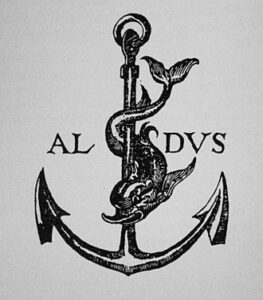

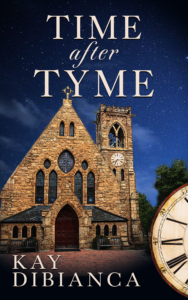
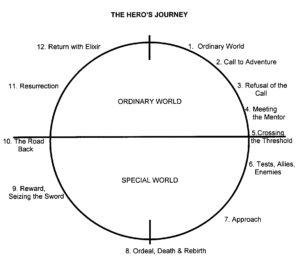
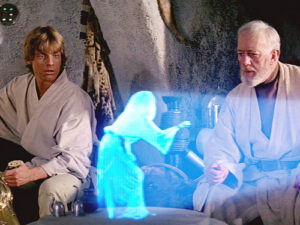
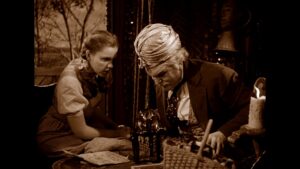
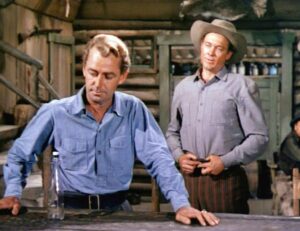

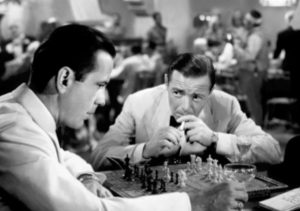 The prime example of Bitter Experience is Casablanca. Rick Blaine had his heart shattered when the woman he loved, Ilsa Lund, abandoned him in Paris just before the Nazi occupation. He has set up shop in Casablanca to forget her. His café is allowed to operate because he takes no sides in the war. His Call to Adventure comes when Ugarte, the scheming rat who murdered German couriers to obtain the valuable Letters of Transit, begs Rick to hide him from the police. Rick refuses with the classic line, “I stick my neck out for nobody.”
The prime example of Bitter Experience is Casablanca. Rick Blaine had his heart shattered when the woman he loved, Ilsa Lund, abandoned him in Paris just before the Nazi occupation. He has set up shop in Casablanca to forget her. His café is allowed to operate because he takes no sides in the war. His Call to Adventure comes when Ugarte, the scheming rat who murdered German couriers to obtain the valuable Letters of Transit, begs Rick to hide him from the police. Rick refuses with the classic line, “I stick my neck out for nobody.” A refusal out of fear or self-doubt must be overcome with a strong emotional jolt. In Finding Nemo, Marlin, Nemo’s father, is afraid of the open ocean because of a past traumatic event—a barracuda attack that killed his wife, Cora, and most of their eggs. He is therefore overprotective of his surviving son, Nemo. Nemo keeps calling his father to adventure—exploring the sea, finding a sea turtle, etc. But Marlin refuses. He is full of fear and self-doubt about his ability to protect his son.
A refusal out of fear or self-doubt must be overcome with a strong emotional jolt. In Finding Nemo, Marlin, Nemo’s father, is afraid of the open ocean because of a past traumatic event—a barracuda attack that killed his wife, Cora, and most of their eggs. He is therefore overprotective of his surviving son, Nemo. Nemo keeps calling his father to adventure—exploring the sea, finding a sea turtle, etc. But Marlin refuses. He is full of fear and self-doubt about his ability to protect his son.
 Patricia Bradley is a Carol finalist and winner of an Inspirational Readers’ Choice Award in Suspense, and three anthologies that included her stories debuted on the USA Today Best Seller List. She and her two cats call Northeast Mississippi home–the South is also where she sets most of her books. Her romantic suspense novels include the Logan Point series and the Memphis Cold Case Novels. Crosshairs, the third book in the Natchez Trace Park Rangers series, released November 2, 2021. She is now hard at work on the fourth book, Deception, and will soon start work on her fourth series set in the Cumberland Plateau around Chattanooga, Tennessee..
Patricia Bradley is a Carol finalist and winner of an Inspirational Readers’ Choice Award in Suspense, and three anthologies that included her stories debuted on the USA Today Best Seller List. She and her two cats call Northeast Mississippi home–the South is also where she sets most of her books. Her romantic suspense novels include the Logan Point series and the Memphis Cold Case Novels. Crosshairs, the third book in the Natchez Trace Park Rangers series, released November 2, 2021. She is now hard at work on the fourth book, Deception, and will soon start work on her fourth series set in the Cumberland Plateau around Chattanooga, Tennessee..
 In
In  For most of his life, the European world recognized Leonardo da Vinci as a painter. In reality, da Vinci wasn’t a prolific painter. He painted sporadically and nominally as a side-line commission. Art experts at Christie’s auction in New York estimate that over 80 percent of Leonardo da Vinci’s paintings were lost over the years. Today, there are only 15 verified da Vinci paintings in the world including Mona Lisa, The Last Supper, and Annunciation. Salvator Mundi sold in 2017 for $450.3 million US.
For most of his life, the European world recognized Leonardo da Vinci as a painter. In reality, da Vinci wasn’t a prolific painter. He painted sporadically and nominally as a side-line commission. Art experts at Christie’s auction in New York estimate that over 80 percent of Leonardo da Vinci’s paintings were lost over the years. Today, there are only 15 verified da Vinci paintings in the world including Mona Lisa, The Last Supper, and Annunciation. Salvator Mundi sold in 2017 for $450.3 million US.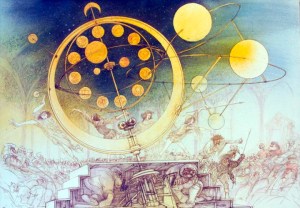 Twenty-first-century science knows a bit of how the human brain functions. But, it’s far from comprehensive knowledge. Science has almost no grasp or understanding of how human consciousness works, and there’s a good reason for that. Brain science is tangible where grey matter can be physically dissected and electrophysiological waves are recordable on computerized graphs. You can fund, study, and measure with reports.
Twenty-first-century science knows a bit of how the human brain functions. But, it’s far from comprehensive knowledge. Science has almost no grasp or understanding of how human consciousness works, and there’s a good reason for that. Brain science is tangible where grey matter can be physically dissected and electrophysiological waves are recordable on computerized graphs. You can fund, study, and measure with reports. “Leonardo da Vinci’s left and right brain hemispheres were intimately connected in an extraordinary way. Because of a large and uniquely developed corpus callosum, da Vinci’s left and right sides constantly communicated and kept each other in the loop on observations and creative options. Each brain side knew what the other was doing, and this gave da Vinci’s mind unprecedented and unrestricted freedom to observe, understand and create.
“Leonardo da Vinci’s left and right brain hemispheres were intimately connected in an extraordinary way. Because of a large and uniquely developed corpus callosum, da Vinci’s left and right sides constantly communicated and kept each other in the loop on observations and creative options. Each brain side knew what the other was doing, and this gave da Vinci’s mind unprecedented and unrestricted freedom to observe, understand and create. The
The  Garry Rodgers’s creative genius was his ability to fool the authorities into keeping him employed as a homicide detective and coroner for over three decades. Now, he’s managed to hoodwink the public into believing he’s a competent crime writer.
Garry Rodgers’s creative genius was his ability to fool the authorities into keeping him employed as a homicide detective and coroner for over three decades. Now, he’s managed to hoodwink the public into believing he’s a competent crime writer. The holiday season is a hectic time, with planning the perfect family celebration, shopping for gifts, decorating the house, inside and out, and mailing cards.
The holiday season is a hectic time, with planning the perfect family celebration, shopping for gifts, decorating the house, inside and out, and mailing cards. Today we have another first page for the TKZ critique machine.
Today we have another first page for the TKZ critique machine.